We Are the Light: No. 1
Madar, the mother or Homeira Qaderi, encouraged her daughter to write her remarkable book, Dancing in the Mosque, with these words: “Look at these birds, Homeira. See! We will tie your stories to the wings of birds, and they will fly to the farthest corners of the earth.”
May the stories of the young Afghan women you find here, likewise deepen the story of Afghanistan and take wing.
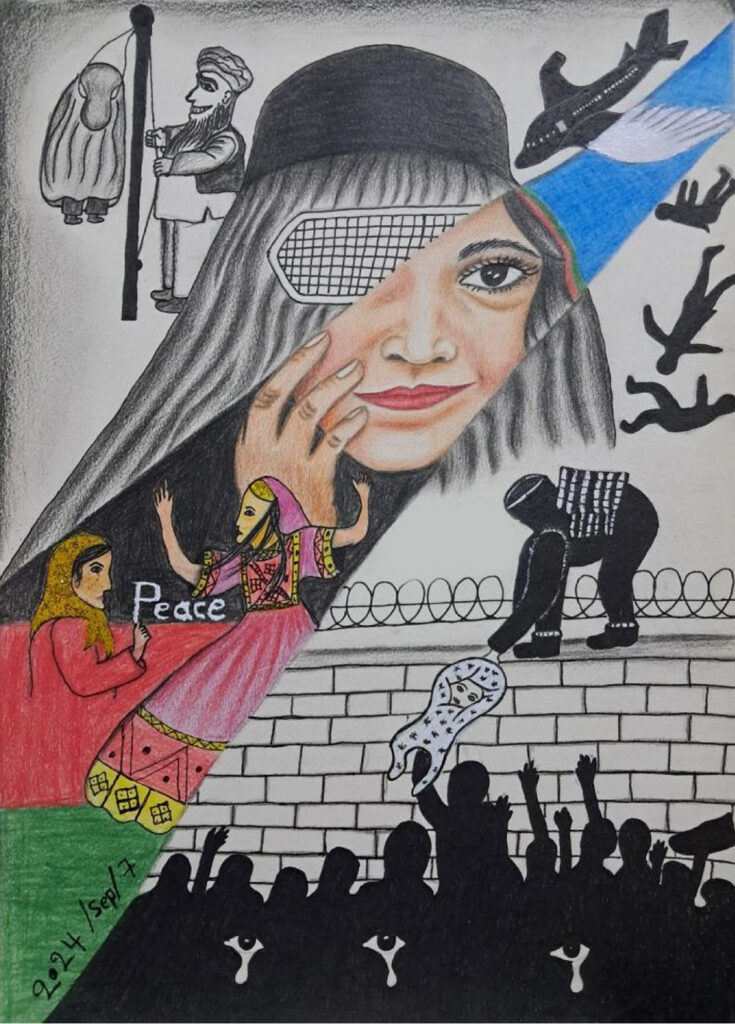
THE DAY THE TALIBAN TOOK CONTROL OF AFGHANISTAN
This drawing depicts the dark day in the history of Afghanistan when the dreams, freedom, and right to education of Afghan girls were taken away by the Taliban group. On the day the Taliban conquered Afghanistan, a large crowd gathered at the airport, but only a few people were able to escape. The airplane with three individuals falling from it to their deaths symbolizes the many terrible events that occurred on that tragic day. The person on the wall is an American soldier lowering a child from one side of the barbed wire to the other side. On that day, many Afghans handed their newborn babies to Americans, hoping for a brighter future for them. The drawing also portrays a member of the Taliban who has hanged a woman. This image represents the countless women and girls that the Taliban killed, and the stripping away of the dreams of education and work from all Afghan girls.
— By Ava | Age: 22
My Story
By Bahar | Age: 20
I am in the most unpleasant situation I have ever had in my life. It started about three years ago when the Taliban took over my homeland country, Afghanistan. I was completely disappointed when I heard from the news that the Taliban had arrived and took the presidential palace. All the people were worried and wanted to leave Afghanistan as soon as possible. I remember that thousands of people rushed to the Kabul International Airport to evacuate to safety. Even my family once tried to enter the Kabul International Airport. However, due to the crowd of people in the entrance of the airport, we could not enter the airport. The people had known that the Taliban could make life horrible, especially for women, as they believed that women should be staying at home instead of working or studying outside. Unfortunately, what the people thought could happen is now going on in Afghanistan as, for three years, the women have not been allowed to work or study at university or go to school after the sixth grade. Afghan women are especially worried now about their lives, educations, and the uncertainty of their futures.
When the Taliban banned women from attending schools and universities, I was put in a situation which made me depressed and feeling anxiety. I was completely disappointed and I thought that I would never be able to continue my education. I graduated from high school the same year as the Taliban took power in Afghanistan. Graduating from high school, I was very enthusiastic to start a new chapter of my educational life by attending university and studying computer science, my dreaming field of study. Fortunately, I participated in the national college entrance examination and enrolled in the BSc Information Technology program in the Faculty of Computer Science at Kabul Education University. I even completed two semesters of my undergraduate studies at the university. The Taliban, however, made my dream of continuing my education only a wish the day they announced the ban on women attending university and school. I thought “Why am I alive if I will not be able to reach my dreams and study at the university?” I believed that my life would be useless if I could not study and reach my educational goals. I was just feeling alive and nothing else, and it was the most painful tragedy in my life. I was firmly disappointed and hopeless once I began to think that being a student at the university in Afghanistan was just a dream which never come true.
I was thinking about my studies and future through days and nights, and every moment I wished hard to have the opportunity to study at the university. I was not the only one with concerns about my studies and dreams. My family have always been a great motivator and they supported me throughout all this time. The smile of my mother is part of my body, the speech of my father is the hope of my life, and my brothers and sisters are the powerful arms of my life. They have all always supported me mentally and financially to continue my education, and always encouraged me to fight difficulties throughout my life. My mother and father always remind me that I should never give up and go further until I reach my goals. They always look at me not only as a girl, but as a hero. So, I made a commitment to myself that I would never give up and I would constantly try to go further for opportunities. With this commitment, I found an online English course, read some books, and engaged in some activities like sports, volunteer teaching, and community participation. Finally, it was by my family’s continuous support that I succeeded in getting admission to one of the best international universities. Currently, I am studying there and am determined to make my educational dreams come true. I am always proud of having such a supportive family, especially my brother who always guides me to overcome obstacles and challenges. This tough situation taught me a great lesson: that we can grow if we stay strong and fight with challenges and obstacles of our lives.
•
The Hidden Struggles of Afghan Girls
By Atifa | Age: 24
Being an Afghan girl is not easy. From the moment we are born, we face gender discrimination. Most of the time, we girls wish we were boys because when our families make decisions, they ask the boys for their opinions but don’t pay any attention to us, as though we don’t even exist. Every decision is made by the men in the family, and everyone else must obey what they say. This is a painful reality we all experience throughout our lives.
This was the situation I faced as a girl living in Kabul. Whenever a man walked behind me, I felt fear and had to guard myself, afraid that he might offend me. When I saw a man in my alley, I wouldn’t enter, even though my house was there, because men seemed like monsters to me. During the previous government, one of the hardest things for me was taking the bus, as men and women traveled together. It’s known that most of the time, men harass girls on buses. Though I never experienced this myself, the stories my friends told me made me scared. I also never remember going out at night because after dark, no girls could go outside. Because night time was when, if someone disturbed you, no one would see it. One of my biggest fears was not being able to get home before evening and worried what might happen to me.
Before the Taliban came, I was a happy girl. I always smiled and spoke with a happy face to others and I was a cheerful girl, at least when I was in educational centers. But after the Taliban took over, I could never be that girl again. During the first year of the Taliban’s rule, for almost six months after the Taliban entered Kabul, they let us attend university. Most of our instructors were Taliban followers and they did not allow us to look at them because they said that men and women who are not mahram should not look at each other, as it is considered haram. In public places, I avoided looking at the Taliban because I feared they might hit me, say something rude, or even arrest me, like they had done to many other girls. They often stopped buses at checkpoints and asked the drivers why they allowed girls to travel without a mahram. When I used public transportation, I fully covered my body and face to protect myself from harassment, not only from Taliban but also other men. This was not just my experience, many girls in Kabul faced the same or even worse.
The situation for girls in Bangladesh is much better. At least here, girls have the freedom to be themselves. Although Bangladesh isn’t developed, it is better than Afghanistan for women. In the two weeks since I’ve arrived in Bangladesh to go to university, I’ve begun to understand what true freedom is and what it is like being free to do whatever I want. Here, no one tells me what to wear or how to behave in public. Having freedom is a basic right for everyone, but it’s something I’ve only ever been able to wish for, until now. I never want to go back to Kabul and experience what I already have experienced.
•
I’ve Lost My Homeland—Have You Seen It?
By Dreamer | Age: 23
The final semester exams were over. I was heading back to the dorm. The weather was perfect. Cotton-like clouds and a sapphire sky after the rain brought a good feeling, but deep within me, there was a sense of homesickness. The sky reminded me of Kabul’s sky. I remembered sitting on the rooftop of my family’s house for hours, gazing at that blue umbrella that gave me a sense of peace, like the roof of a house—just as protective and safe.
Lost in memories, I reached my dorm room. My roommate came in with joy, hugged me tightly, and said, “Finally, the term is over; tomorrow I’m going home to my family.” She asked me, “Zubaida, don’t you want to go home?” I said, “What?” She repeated, “Home?”
I paused and suddenly snapped out of my dream to reality; the word felt alien to me. Hearing it, no image formed in my mind. I thought, “What home? Do I belong anywhere enough to call it mine?” It’s been a long time since they took my home away; almost two years ago, I had to leave my homeland to continue my studies and move to Bangladesh. Now, I am a wanderer.
I don’t know exactly who or what forces in the world compelled me to leave—the world is so confusing, filled with powers beyond comprehension, perhaps that’s what made it even harder to stay. It was against my will. Now, I am an exile in an unfamiliar place, where the streets and alleys evoke only a sense of estrangement. I am surrounded by people with whom I share neither connection nor understanding. There is shelter, but it is not home. Any place where your heart, mind, and loved ones are absent cannot truly be called home.
After wrestling with my thoughts, I noticed my roommate’s suitcase, which smelled of separation and departure. It reminded me of the suitcase in which I couldn’t fit Kabul, my Afghanistan, to carry with me. Then, I looked into my roommate’s eyes. They were not like the soft pearls that my loved ones’ eyes were when we parted. They were sparkling in a way that lit up the whole room. She was happy, knowing that the fatigue of the dorm and her studies would vanish upon seeing her loved ones.
I didn’t realize how pitiful I must have seemed until she suddenly hugged me tightly and said, “It’s okay. If you’re feeling down, I won’t go.”
With one hug and one question, I experienced a flood of emotions. Three years of severe Taliban rule flashed before my eyes in just a few minutes. Yet, my Afghan pride didn’t allow me to say that I couldn’t return to Afghanistan; I couldn’t say that I was homeless.
My roommate didn’t understand that the Taliban do not allow girls to study abroad without any mahram (without any male relative.) As a result of breaking this rule, returning now could put me at risk. I said, “I just haven’t had time to think about it yet. Maybe I won’t go to Afghanistan, but I’ll consider going somewhere else.” Even though every cell in my body longed to leave, I longed for a tight embrace from my homeland, Afghanistan, to keep me warm for another three years until my graduation.
What a strange feeling… having no place to go on your vacation.
Since I migrated, I haven’t found peace anywhere. I always want to leave wherever I am. My mind is constantly occupied with the thought of leaving. I want to go somewhere where I can settle and never think of leaving again. I want to be happy, like a person who is happy in their homeland. You see, after leaving my homeland, I realized that if happiness could be tangible, for me, it would be Afghanistan, but not the Afghanistan of today, the most depressed country in the world. No, I long for the Afghanistan of three years ago, with its vast blue sky and free, ambitious women.
I AM…
I am a girl in the prime of honesty, virtue, and grace
I wonder each day what anxieties I will go through
I hear the voice of my mother calling to me, saying
“I’ll be there for you. Just keep going, my daughter.”
The beauty of life is just waiting there for me to notice
I want a day in my homeland when I can walk down the street
in a colorful outfit going to work
I dream of a day when women and girls have freedom to live life…
I pretend I am strong when I’m under severe pressure
When I feel this weight on my chest, I pretend I am strong
just for my mother
I want some day to be on my bed and do nothing
A touch my face to wipe the flow of tears…
I cry when I feel the weight of the world…
I am…
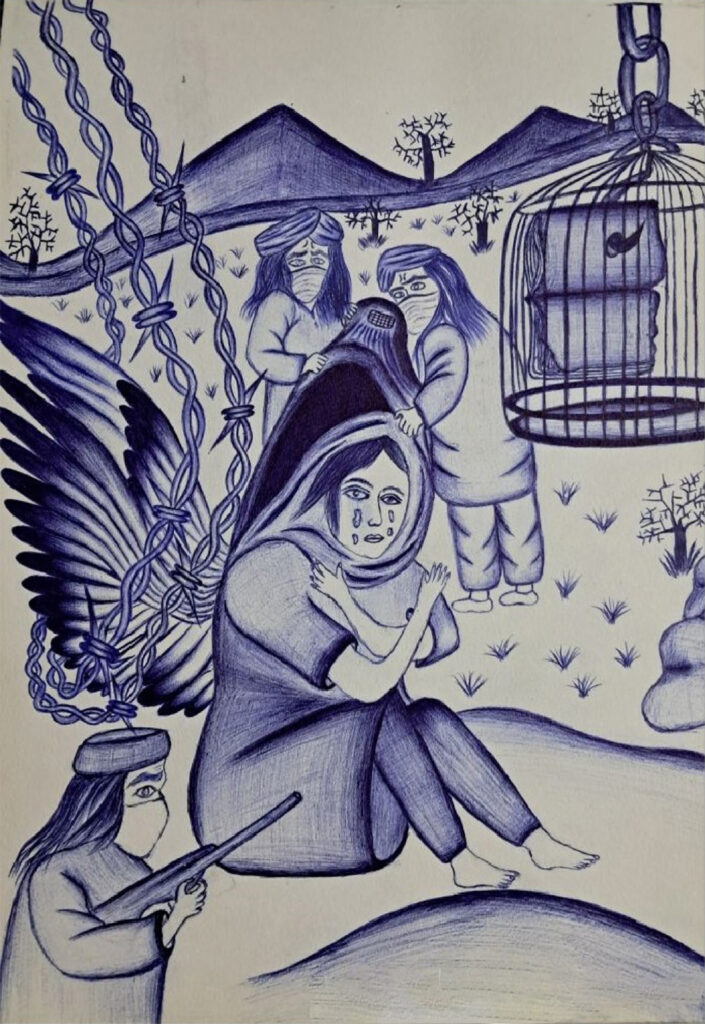
THE IMPRISONMENT OF AFGHAN GIRLS’ DREAMS OF SCHOOL
The wings of the girl depicted in this painting are bound and chained. This symbolizes the imprisonment of Afghan girls’ dreams, particularly the imprisonment of their dreams of receiving an education. Through their oppressive laws, the Taliban have imprisoned these dreams. The book enclosed in a cage further illustrates this policy. The drawing also shows how the Taliban force Afghan girls and women to cover themselves with a burqa.
— By Ava | Age 22
Echoes of a Vanished Homeland
By Eman | Age: 23
Dear World,
I am writing to share the painful reality of my recent return to Afghanistan and the profound impact it has had on my life and my family’s well-being.
Returning to my homeland from my university in Bangladesh was the most difficult experience I have ever faced. I had envisioned it as a joyful homecoming, but instead, it felt as though I had been transported to a world that had moved on, leaving me behind.
My eyes filled with tears when I saw that the Taliban had turned the kindergarten near my home into a checkpoint station. A place where children once played, laughed, sang, and studied had now become a checkpoint. The contrast between the man standing there, armed and fearful, and the innocent laughter and joy of the children was heart-wrenching. Every step I took was weighed down by the transformation and loss. Policies had grown stricter, to the point where I needed a male companion to walk near my own home. I had to wear a garment that covered my entire body, even in the sweltering heat.
The once-familiar streets were now unrecognizable. Each corner, once a part of my life, now told a story of change, loss, and disappointment. The unspoken expectations and judgments directed toward me as a young woman felt sharper and more tangible. Everywhere I went, I encountered new slogans and posters reminding women to wear the full-body hijab, with only their eyes exposed.
My heart ached not just for the loss of familiar places but for the way the Taliban’s rule had impacted my family. Before the Taliban, my father had served as a judge for 22 years, working on many cases, including those involving the Taliban. Now, he could no longer work and spent his days tending to the flowers in our home. My mother, an English teacher for 30 years, had taught girls in the 12th grade and was a graduate of the English literature faculty at Kabul University. But now, she was confined to the house as well. My sister, with her master’s degree in economics, had worked as a manager in the Ministry of Finance, but the Taliban no longer allowed her to work. My two brothers, who had earned their bachelor’s
degrees in law and had started their master’s degrees, had to abandon their studies when the Taliban came, as my father could no longer afford the fees. As for myself, I was a student in the psychology faculty at Kabul University, just one semester away from earning my bachelor’s degree. I had worked so hard to get there, as I wanted to be a psychologist and treat traumatized patients, but when the Taliban came, everything was taken away. All of these changes have left my family struggling with a low income.
Returning home to Afghanistan was not safe or secure. It felt as though I was standing outside a house that once belonged to me, now unfamiliar, with a strange car in the driveway, a door painted a new color, and different flags hanging everywhere. Through the window, I saw posters and flags with menacing slogans and Taliban pictures replacing the old advertisements for educational centers and universities. It is strange how a place can feel like yours until it is not yours at all. Everything was familiar, yet everything had changed. Part of me wanted to stay, but another part screamed for me to leave.
I returned to Afghanistan because my university in Bangladesh wanted me to go home for treatment, as I had a kidney stone. Managing the travel expenses was a challenge, and though I was very sick, I could not ask my family to cover the costs because of our financial situation. Eventually, when my condition worsened, my family borrowed money from relatives.
I stayed in Afghanistan for three months, and despite the hardship, I cherished being with my family. Their love was my only solace. However, when it was time to return to Bangladesh and continue my studies, the financial burden loomed large again. I had to travel with my brother as my mahram because my father, due to his previous role as a judge, could not accompany me. The cost of both tickets amounted to $1,600, and my father had to sell some household items, including a carpet from our living room, to cover the expenses. It was heartbreaking for all of us, especially for me, as it was all because of me. But my father insisted, saying, “I sell all these things just so you can study.”
At the Kabul airport, I was nervous, knowing there would be many checkpoints. The first checkpoint stopped my brother and me because of my student visa. They said women were absolutely prohibited from studying and that I could not go. After pleading with them, through tears and a trembling voice, they allowed us to pass. However, at another checkpoint, the Taliban confiscated my computer, stating that no computers were allowed. I was devastated. My computer held all my documents, files, research, and personal records. I could not argue, as pushing too hard might have resulted in their not allowing me to leave at all. I had to walk away, leaving behind what felt like my entire academic life.
We proceeded to the terminal, and the plane took off. We landed in Iran, where I needed to book a ticket to Dubai before heading to Bangladesh, as there was no direct flight. This made the journey even more expensive. At the ticket counter, the first airline, Air Arabia, refused to sell me a ticket because I held an Afghan passport. We tried the second airline, Fly Dubai, which was more expensive. They also refused, but said they might make an exception if I could prove I was a student. I contacted my university, and after two days of waiting, they confirmed my student status. However, Fly Dubai’s tickets were still expensive, and my brother had to sell his phone to cover the cost.
At one airport, I was not allowed to leave because I was a student, and at another, I was only allowed to leave because I could prove I was a student. How crazy has the world become?
In the end, I am grateful to my family, who worked so hard to make my return possible. Yet, what was once a dream of returning to my homeland has turned into a dark memory. The rejection due to my Afghan passport and the loss of my computer were among the hardest blows. Every night, I am haunted by nightmares, wondering about the future and what will happen. I constantly worry about my family in Afghanistan. Even as I complete my studies in Bangladesh, I fear what comes next. There seems to be no hope or future for education, especially for women and girls in Afghanistan.
I am writing to draw global attention to the dire situation in Afghanistan, where my family and countless others are enduring extreme hardship. The current conditions are exceptionally challenging, and survival has become a daily struggle, especially for my family. Please, people around the globe, hear our plea for support and solidarity during these trying times. The suffering and uncertainty faced by those in Afghanistan are real and pressing. Any awareness or assistance provided would be deeply appreciated.
For the safety of my family, I must use a pseudonym in this letter. I have chosen the name Eman, which in Persian means “belief.” This simple yet profound word embodies the essence of hope and strength. Belief is not a passive state but a dynamic force that fuels our dreams and guides us through challenges. It’s the quiet assurance that even in the darkest times, a glimmer of light remains. To believe is to hold onto the hope that tomorrow can be better, and that through resilience and faith, we can overcome trials. By choosing Eman, I embrace this powerful notion. It represents a commitment to hope, courage, and the promise of a brighter future. It reminds us that, no matter the difficulties we face, our belief in a better tomorrow can be our greatest source of strength.
Thank you for your attention.
Sincerely,
Eman
•
The Day of My 19th Birthday
By Silsila Makhfi | Age: 19
Today is the 17th of November, the very same day I opened my eyes for the first time 18 years ago. This will be my first piece of writing as a 19-year-old teenager. Birthdays for other girls around my age are a joyous celebration, they spend them with their loved ones and look forward to another exciting year ahead of them. However, a heavy sadness has taken hold of my heart, choking my spirit. Yet one more year of my life went by in vain. Once again, I failed to live for myself; all I did was fulfill the expectations of others.
In the morning, the sun’s golden rays cast their light upon the window framed by simple hand-sewn curtains, and our neighbor Uncle Yusuf’s hens’ clucking reached my ears. I decided to use my culinary skills and prepare something to bring a smile to my siblings and mother’s faces. I thought, if only I could afford to buy a cake that would be even better, but that didn’t mean I couldn’t prepare other things at home. With the few ingredients available, I decided to bake cookies and prepare Scheer berenj (rice and milk with cream).
I entered the kitchen with anticipation and my smart plan. Here in this kitchen, my great-grandmother used to cook for her children and husband. A large, sturdy table sits in the center, its surface marked by years of use, and a well-used cast iron skillet and a mortar and pestle sit on top of it. I put on the patterned apron and started my work.
Soon my mother and sisters joined me in the kitchen. We had a lively chat and the sound of joyous laughter surrounded me. My 14-year-old brother, with his great sense of humor, came and sat on the orange carpet, cracking jokes. I wish I could see my family this happy and carefree all the time.
Well, our happiness is always short-lived. My father yanked the door open. Looking at the furious expression on his face, I already understood my father’s sister must have said something to him. It has been 6 years since my family came to live together with my aunt’s family. Since then, our household has changed for the worse. Whenever his sister provokes my father with words like, “Brother, it is sad that you don’t look like the real Afghan men, whose sight makes their children and wife shudder. You need to have more control,” this is an adequate reason for him to vent his anger on us.
I connected the dots, but his question caught me off guard. “What’s going on?”
Before I could respond, my youngest brother enthusiastically said, “Father, it is elder sister’s birthday, so she is cooking for us!”
His second question was directed straight toward me, “Did I permit you to celebrate this disastrous day?” I cringed at his sharp words. Surprisingly, I also felt myself that my birthday wasn’t worth celebrating because I knew as soon as I was born, I was solely welcomed by pain.
19 years ago, my father was eagerly expecting the birth of his son, only to discover that he had a daughter. I took a deep breath to embrace myself since I knew I had to handle the tantrums he would now throw and the hours-long lectures I had to hear. To assure my beloved mother whose face was filled with worry and sisters that it was alright, I plastered a forced big smile on my face. I listened to his curses and belittling words, without talking back to him.
Here I am now, all alone, on the verge of breaking down, the emotions I had bottled all day long are overflowing. Onto the tear-stained paper with a cracked pencil in my hand, I am pouring all of my emotions.
Sometimes words are akin to knives piercing your heart. It is wise to let go of them and not replay them at the back of your mind again and again. When you do so, you can free yourself from the cage. Please never let those negative emotions ruin you but rather transform them into positive emotions. This brings me to appreciate the quote from Sheryl Crow, “No matter how chaotic it is, wildflowers will still spring up in the middle of nowhere.”
Feeling relieved and hopeful, I wiped my tears, stood tall, and played the song “Fearless” by Isabela Merced. These parts of the lyrics shone the light in my heart.
And when the night is cold and dark,
Know that you have fire in your heart.
Be strong, be brave,
Let courage lead the way.
Stand tall,
And know who you are.
My drawing demonstrates my transformation that day:
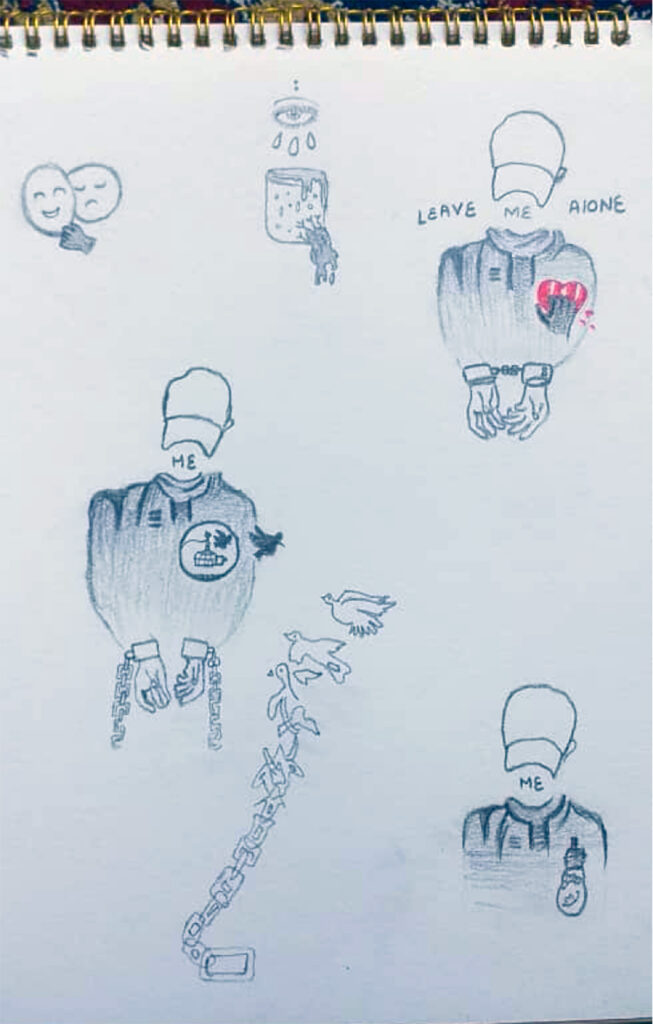
A little advice: Life can be difficult at times. I believe the majority of people will be able to relate to your reality. Don’t allow others to shatter your self-esteem. Respect yourself even when no one else does.
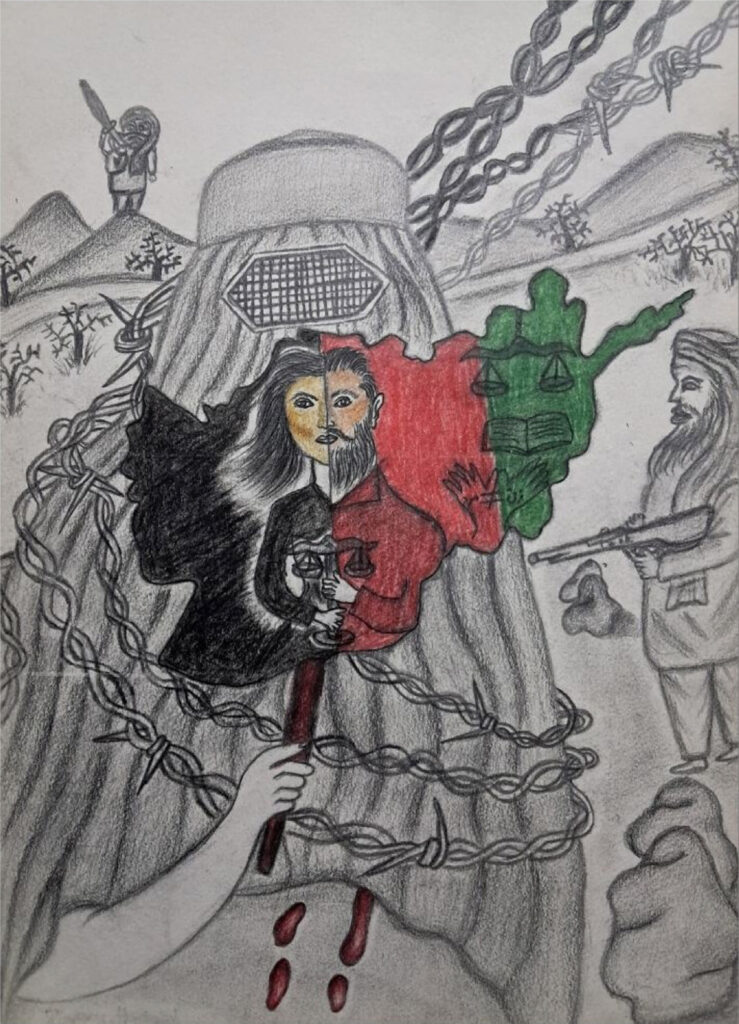
A GIRL IN CHAINS
The girl in this painting is bound in chains, representing the oppressive laws of the Taliban. These harsh laws, which prohibit education and work, are very painful for Afghan women and girls. Despite her pain, this girl is holding up a map of Afghanistan. She is representing the girls and women from all over Afghanistan who are calling on the world for help in opening pathways for them so they can pursue their educations. They aspire to one day implement equal rights for men and women in their country and ultimately overcome the cruel and ignorant laws of the Taliban.
— By Ava | Age: 22
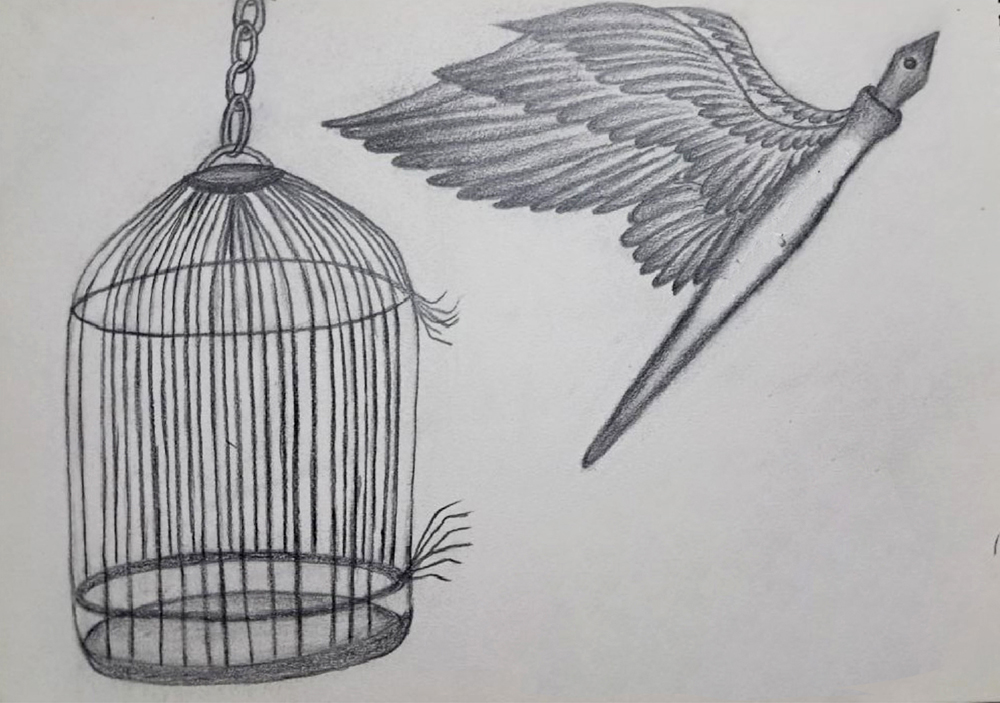
THE PEN IN FLIGHT
This painting represents the passion and aspirations of every Afghan girl, envisioning a day when there will be peace and security in the country.
— By Ava | Age: 22
ROOM is entirely dependent upon reader support. Please consider helping ROOM today with a tax-deductible donation. Any amount is deeply appreciated. |



